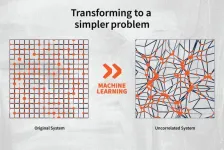(Press-News.org) Men in England, Scotland and Northern Ireland offered up to £400 for hitting weight loss targets lost more weight than those not given cash incentive
Win-win strategy could pay for itself, say researchers
*Note: this paper is being presented at the European Congress on Obesity (ECO) and is being published in JAMA. Please credit both the congress and the journal in your stories.*
A new study presented at the European Congress on Obesity (ECO) in Venice, Italy (12-15 May), and published simultaneously in JAMA, has concluded that text messages with financial incentives can help men who are living with obesity lose weight and could be a valuable alternative to traditional weight management programmes.
Men who were offered cash for hitting weight loss targets lost more weight than those not given a financial incentive, the UK-based Game of Stones trial found.
Around 26% of men of men in the UK are living with obesity.1 However, men are under-represented in weight loss trials and less likely than women to attend traditional weight loss groups – and this is particularly the case for men from lower socioeconomic groups.
Professor Pat Hoddinott, of the Nursing, Midwifery and Allied Health Professions Research Unit at the University of Stirling and team wanted to explore whether the combination of text messages and cash incentives would help men, including those from lower socioeconomic groups, lose weight.
She explains: “One of the most effective incentive strategies in the literature uses ‘deposit contracts’, where people deposit their own money and lose it if they do not meet weight loss goals. This is informed by behavioural economic theory which proposes that people are more motivated by the prospect of losing money than the prospect of gaining money.
“However, not everyone can afford to deposit their own money, so we designed the Game of Stones trial, which uses an endowment incentive, where the money is put in an account at the start, allowing men on low incomes to join.
A text message-based programme, meanwhile, costs less and is less labour-intensive than a traditional weight loss programme.
“Men who were living with obesity helped design the structure of the incentives and helped us write the text messages,” says Professor Hoddinott.
Professor Hoddinott and colleagues ran the 12-month-long randomised Game of Stones clinical trial in Belfast, Bristol and Glasgow. It involved 585 men living with obesity (average age 50.7 years, average weight 118.5kg/18st 9lb, average BMI 37.7kg/m2) who were randomly assigned to one of three groups: text messaging with financial incentives, text messaging alone or waiting list (control).
Those assigned to the text messaging with financial incentives group (n=196) received daily text messages, including motivational messages, tips from other men on how they changed their eating habits and lifestyle and links to evidence-based websites. They were also given access to a study website with evidence-based information on weight management, information about local weight management services and an online tracker to monitor their weight change.
They were also told that £400 had been placed in an account for them and would be transferred to them at the end of the trial. However, some of the money would be lost each time they failed to meet one of three weight-loss targets. £50 would be taken away if they didn’t lose 5% of their body weight after 3 months, £150 taken away if they didn’t lose 10% of their weight after 6 months and £200 taken away if they hadn’t maintained the 10% weight loss after a year.
The men assigned to the text messaging alone group (n=194) received the same text messages and could use all the features on the study website but were not offered financial incentives for weight loss.
Those in the control group (n=195) only had access to the evidence-based weight management information.
426/585 of the men logged their weight after 12 months.
The men in the text messaging with financial incentives group lost the most weight. They lost 4.8% of their body weight (5.7kg/13lb) over 12 months, on average; this compares to 2.7% (3kg/6.6lb) for the text messaging only group and 1.3% (1.5kg/3.3lb) for the control group.
Further analysis revealed that weight loss in the text messaging with financial incentives group was statistically significant compared to the control group. In contrast, weight loss in the text messaging alone group did not differ significantly from the control group.
Four men would need to receive text messages with financial incentives for one to achieve weight loss of 5% or more and five would need to take part for one to achieve weight loss of at least 10%, say the researchers.
The men in the text messaging with financial incentives group received £128 each, on average, with 27 receiving the full £400.
Survey results showed that men in the text messaging with financial incentives group rated their health as being significantly better at the end of the trial.
Professor Hoddinott adds: “It is also important to note that we were able to recruit men from several populations normally under-represented in weight management trials.
“Some 39% of the men lived in less affluent areas, 71% reported a long-term health condition, 40% reported two or more long-term conditions and 29% reported that they were living with a disability. In addition, 25% of the men told us they had a doctor-diagnosed mental health condition and a further 24% reported low mental health scores.”
The researchers conclude that text messages with financial incentives are effective at encouraging weight loss in men living with obesity and could potentially be delivered at scale.
They hope the strategy will be adopted by the NHS and say that given the huge cost of overweight and obesity to the NHS, the use of financial incentives could potentially pay for itself in the long term. A health economic evaluation is underway.
Professor Hoddinott adds: “We reached an underserved group of men who seldom take part in health promotion activities. Weight management programmes are traditionally intensive, often with a weigh-in every week or two. In Game of Stones, there are just four brief ten-minute weigh-ins over a year. No intervention is delivered by the staff at the weigh-ins, so minimal staff training is required. No referral is needed to join.
“Men and NHS staff really valued this low burden approach and it has the potential to address health inequalities. It was a win-win for all.”
END
Text messages with financial incentives can help men who are living with obesity lose weight, UK study finds (JAMA)
2024-05-15
ELSE PRESS RELEASES FROM THIS DATE:
Scientists develop an affordable sensor for lead contamination
2024-05-14
Engineers at MIT, Nanytang Technological University, and several companies have developed a compact and inexpensive technology for detecting and measuring lead concentrations in water, potentially enabling a significant advance in tackling this persistent global health issue.
The World Health Organization estimates that 240 million people worldwide are exposed to drinking water that contains unsafe amounts of toxic lead, which can affect brain development in children, cause birth defects, and produce a variety of neurological, cardiac, ...
UC Irvine-led study links sleep apnea severity during REM stage to verbal memory decline
2024-05-14
Irvine, Calif., May 14, 2024 — A research team led by the University of California, Irvine has revealed the link between the frequency of sleep apnea events during the rapid-eye-movement stage and the severity of verbal memory impairment in older adults at risk for Alzheimer’s disease. Verbal memory refers to the cognitive ability to retain and recall information presented through spoken words or written text and is particularly vulnerable to Alzheimer’s.
The study, recently published online in the journal Alzheimer’s Research & Therapy, discovered a specific correlation between the severity of sleep apnea – when breathing pauses while ...
What’s actually in your supplements? Chapman University researchers detect hidden ingredients and questionable claims in supplements
2024-05-14
A recent study published in Analytical Science Journal conducted by Schmid College of Science and Technology Professor Rosalee Hellberg and students Calin Harris, Diane Kim, Miranda Miranda and Chevon Jordan, reveal that some supplement companies may mislead customers with unproven health claims and undeclared ingredients.
The researchers focused on supplements that have been associated with the purported treatment or prevention of COVID-19 and other respiratory illnesses. During the pandemic, the use of dietary supplements skyrocketed throughout the world. “There was a big spike in purchase and use of these types ...
STRIVE project to study ozone, atmospheric layers among finalists for next-generation NASA satellite
2024-05-14
A project led by the University of Washington to better understand our atmosphere’s complexity is a finalist for NASA’s next generation of Earth-observing satellites. The space agency this week announced the projects that will each receive $5 million to advance to the next stage and conduct a one-year concept study.
STRIVE seeks to better understand the troposphere that we inhabit and the stratosphere above it, where the ozone layer is, as well as the interface where these two layers meet. That interface, about 6 miles (10 kilometers) above the surface, is where important ...
Simulating diffusion using 'kinosons' and machine learning
2024-05-14
Researchers from the University of Illinois Urbana-Champaign have recast diffusion in multicomponent alloys as a sum of individual contributions, called “kinosons.” Using machine learning to compute the statistical distribution of the individual contributions, they were able to model the alloy and calculate its diffusivity orders of magnitude more efficiently than computing whole trajectories. This work was recently published in the journal Physical Review Letters.
“We found a much more efficient way to calculate diffusion in solids, and at the same time, we learned more ...
Far from toxic, lactate rivals glucose as body's major fuel after a carbohydrate meal
2024-05-14
As a student competing in track and field at his Parlier high school, Robert Leija was obsessed with how to improve his performance and, in particular, prevent the buildup of lactic acid in his muscles during training. Like many athletes, he blamed it for the performance fatigue and muscle soreness he experienced after intense workouts.
But as a kinesiology student at Fresno State, he was handed an out-of-print textbook that told him he had it all wrong. Lactate wasn't a danger sign that athletes had depleted their body's supply of oxygen, but likely a normal product of the metabolic activity required to fuel the muscles during sustained exercise.
Now, as a graduate student ...
AI for more caring institutions
2024-05-14
More and more public services — such as affordable housing, public school matching and child welfare — are relying on algorithms to make decisions and allocate resources. So far, much of the work that has gone into designing these systems has focused on workers’ experiences using them or communities’ perceptions of them.
But what about the actual impact of these programs have on people, especially when the decisions the systems make lead to denial of services? Can you design algorithms to help people make sense of and ...
Astronomers spot a giant planet that is as light as cotton candy
2024-05-14
Astronomers at MIT, the University of Liège in Belgium, and elsewhere have discovered a huge, fluffy oddball of a planet orbiting a distant star in our Milky Way galaxy. The discovery, reported today in the journal Nature Astronomy, is a promising key to the mystery of how such giant, super-light planets form.
The new planet, named WASP-193b, appears to dwarf Jupiter in size, yet it is a fraction of its density. The scientists found that the gas giant is 50 percent bigger than Jupiter, and about a tenth as dense — an extremely low density, comparable to that of cotton candy.
WASP-193b is the second lightest planet discovered to date, ...
Sleep experts to convene in Houston for SLEEP 2024 annual meeting
2024-05-14
DARIEN, IL – Leading sleep and circadian scientists, sleep clinicians, and industry innovators will gather June 2-5 in Houston at SLEEP 2024, the 38th annual meeting of the Associated Professional Sleep Societies, LLC. Thousands of sleep professionals will connect, explore, and grow at the world’s premier clinical and scientific sleep meeting, held jointly by the American Academy of Sleep Medicine and the Sleep Research Society.
“Every year, SLEEP brings together the world’s ...
Rice’s Mamouras wins NSF CAREER Award
2024-05-14
HOUSTON – (May 14, 2024) – As the Internet of Things (IoT) grows larger and more complex, it becomes increasingly difficult to develop applications.
“A common approach to this problem is to move data from the sensing devices to a central location, such as the cloud, for processing,” said Konstantinos Mamouras, assistant professor of computer science at Rice University. “But this centralized approach underutilizes the small IoT devices at the edge of the network and can overwhelm it due to the large movement of data.”
With his five-year, $547,555 National Science Foundation CAREER Award, Mamouras aims to decentralize the IoT, relieve network congestion and ...





